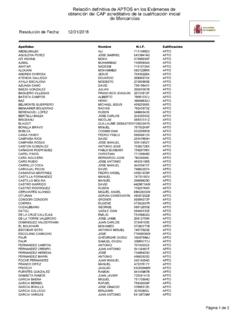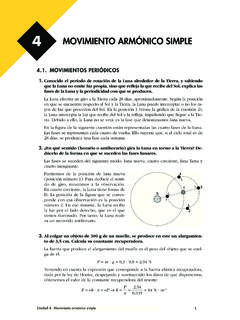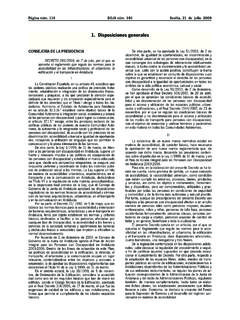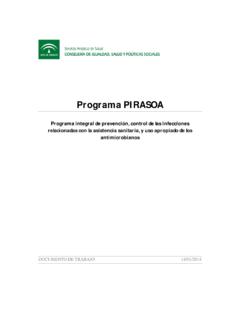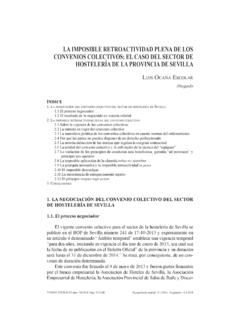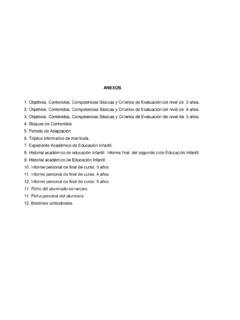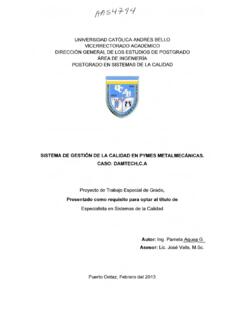Transcription of MINISTRY OF LABOUR AND SOCIAL SECURITY …
1 MINISTRY OF LABOUR AND SOCIAL SECURITY BOE [Official Gazette] 29 March 1995, no. 75, [p. 9654]; WORKERS STATUTE. Approves the Consolidated Text of the Law on the Workers Statute The seventh final provision of Law 42/1994 dated 30 December, on Tax, Administrative and LABOUR Measures, authorizes the Government to prepare a consolidated text of Law 8/1980 dated 10 March on Workers Statute, incorporating the modifications introduced by it as well as those made by the legal provisions it enumerates within an interval of three months from the date that the Law comes into force. Likewise, the final provision of Law 4/1995 dated 23 March, on the Regulation of Parental and Maternity Leave, gives orders to include the modifications it produced in the Workers Statute into the consolidated text.
2 By virtue of these, upon the proposal of the MINISTRY of LABOUR and SOCIAL SECURITY , subject to the opinion of the Economic and SOCIAL Council and the report of the General Council of the Judiciary, in accordance with the Council of State and subject to the deliberation of the Council of Ministers at their meeting on 24 March 1995, I hereby decree: Sole Article. The Consolidated Text of the Law on the Workers Statute inserted below is approved. FINAL PROVISION. Sole Final Provision. The present Royal Legislative Decree and the consolidated text that it approves shall come into force on 1 May 1995. APPENDIX Consolidated Text of the Law on the Workers Statute HEADING I On Individual LABOUR Relations CHAPTER I General Provisions Section 1. Scope and Sources Article 1. Scope of Application. 1. The present Law shall be applicable to the workers voluntarily rendering their services for compensation on behalf of another party, within the scope of the organization and management of another, physical or legal person, called the employer or entrepreneur.
3 2. For the purposes of this Law, employers shall be those physical or legal persons or joint owners who are rendered services by the persons referred to in the preceding section, as well as by persons contracted for their cession to user companies by legally-constituted temporary work companies. 3. The following are excluded from the scope regulated by the present law: a) The service relations of civil servants, which shall be regulated by the Statute of Civil Service, as well as those of personnel in the service of the State, Municipal Corporations and Regional Public Entities, where such relations are governed by administrative or statutory regulations under the protection of a Law. b) Obligatory personal services. c) Activities that are purely and simply limited to the mere performance of the functions of a director or member of the administrative organs in companies taking the legal form of corporations, provided that such activities in the company only involve the performance of tasks inherent to such a position.
4 D) Jobs done on account of friendship, benevolence or good-neighbour relationships. e) Family tasks, unless the salaried-worker status of those carrying these out is demonstrated. Descendants, ascendants and other relatives up to and including the second degree of consanguinity or affinity and, as applicable, adoption, shall be considered family members for this purpose. f) The activities of persons intervening in trading operations on behalf of one or more entrepreneurs, provided that these are personally obliged to respond for the good conduct of the operation, assuming the full risk for it. g) In general, any job performed in compliance with a relationship other than that defined in Section 1 of this article. For such purposes, the activities of persons rendering transport services for the pertinent price under the aegis of the administrative authorities owning them, using commercial vehicles for public service that they own or directly dispose of, even when these services are rendered continuously for a same transporter or merchandiser, are understood as excluded from LABOUR coverage.
5 4. Spanish LABOUR law shall be applicable to the work rendered by Spanish workers contracted in Spain at the service of Spanish companies abroad, without restriction to the public regulations that may be applicable to the workplace. Said workers shall enjoy at least the economic rights that would correspond to them had they been working in Spanish territory. 5. For the purposes of this Law, production units having a specific organization registered as such before the LABOUR authorities shall be considered work centres. In work at sea, the ship shall be considered as a work centre and understood as located in the province where its home port is found. Article 2. Special LABOUR Relations 1. The following shall be considered as special LABOUR relations: a) That of top management personnel not included in Article c). b) That of domestic help.
6 C) That of convicts in penitentiary institutions. d) That of professional sportsmen and women. e) That of artists in public spectacles. f) That of persons intervening in trading operations in behalf of one or more entrepreneurs without assuming full risk thereof for these. g) That of handicapped workers rendering services in special employment centres. h) That of port stevedores rendering services through state companies or of persons performing the same functions as these in the ports managed by Regional Governments. i) Any other job expressly declared a LABOUR relationship of special character by a Law. 2. In all the cases set forth in the preceding section, the regulation of the said LABOUR relations shall respect the basic rights acknowledged by the Constitution. Article 3. Sources of LABOUR Relations. 1. The rights and obligations regarding LABOUR relations are regulated: a) By the legal and regulatory provisions of the State.
7 B) By collective bargaining agreements. c) By the volition of the parties made manifest in the work contract, provided that its purpose is licit, and that in no case may the worker be granted conditions less favourable or contrary to the legal provisions and collective bargaining agreements mentioned beforehand. d) By local and professional practices and customs. 2. The legal and regulatory provisions shall apply in strict observance of the principle of standard hierarchy. Regulatory provisions shall develop the precepts established by norms of a superior category, but may not establish working conditions different from those established by the laws to be implemented. 3. Conflicts arising between the precepts of two or more LABOUR standards, whether imposed by the State or agreed on, are bound to respect, in any case, the minimums required by law, and shall be resolved through the application of the most favourable terms for the workers as a group, and, in yearly computations, considering quantifiable factors.
8 4. Practices and customs shall only apply in the absence of conventional or contractual legal provisions, unless express admission or waiver exists. 5. Workers may not validly avail of the rights acknowledged to them by mandatory legal provisions before or after their acquisition thereof. Neither may they validly avail [in these conditions] of the rights acknowledged as indispensable by collective bargaining agreement. Section 2. Basic LABOUR Rights and Duties Article 4. LABOUR Rights. 1. Workers have the basic right to the following, along with the content and scope provided for by specific regulations for each item: a) Employment and free choice of occupation and trade. b) Free association. c) Collective bargaining. d) Adoption of measures for LABOUR disputes. e) Strike. f) Meetings. g) Participation in the company.
9 2. In LABOUR relations, workers have the right: a) To actual employment. b) To promotion and occupational training at work. c) Not to be directly or indirectly discriminated in employment, or, once employed, discriminated by reason of sex, civil status, age within the limits set forth by this Law, racial or ethnic origin, SOCIAL status, religion or convictions, political ideas, sexual orientation, membership or non-membership in a union, or for reasons of language within the Spanish State. Neither may they be discriminated due to of handicap, provided that they have the aptitude to perform the job or work in question. d) To their physical integrity and an adequate policy on safety and hygiene. e) To respect for their privacy and consideration for their dignity, including protection against harassment by reason of racial or ethnic origin, religion or convictions, handicaps, age or sexual orientation, and against sexual and sexist harassment.
10 F) To the punctual receipt of the compensation agreed on or legally established. g) To the individual exercise of the actions deriving from their work contract. h) To any other rights specifically deriving from their work contract. Article 5. LABOUR Duties. Workers have the following basic duties: a) To fulfil the specific obligations inherent to their work post, in keeping with the tenets of good faith and diligence. b) To observe the safety and hygiene measures adopted. d) To fulfil the orders and instructions of the employer in the regular exercise of his/her managerial authority. d) Not to compete with the activity of the company in the terms set forth in this Law. e) To contribute to the improvement of productivity. f) Whatever other duties arise, as applicable, from their respective work contracts. Section 3. Elements and Effectiveness of the Work Contract Article 6.
